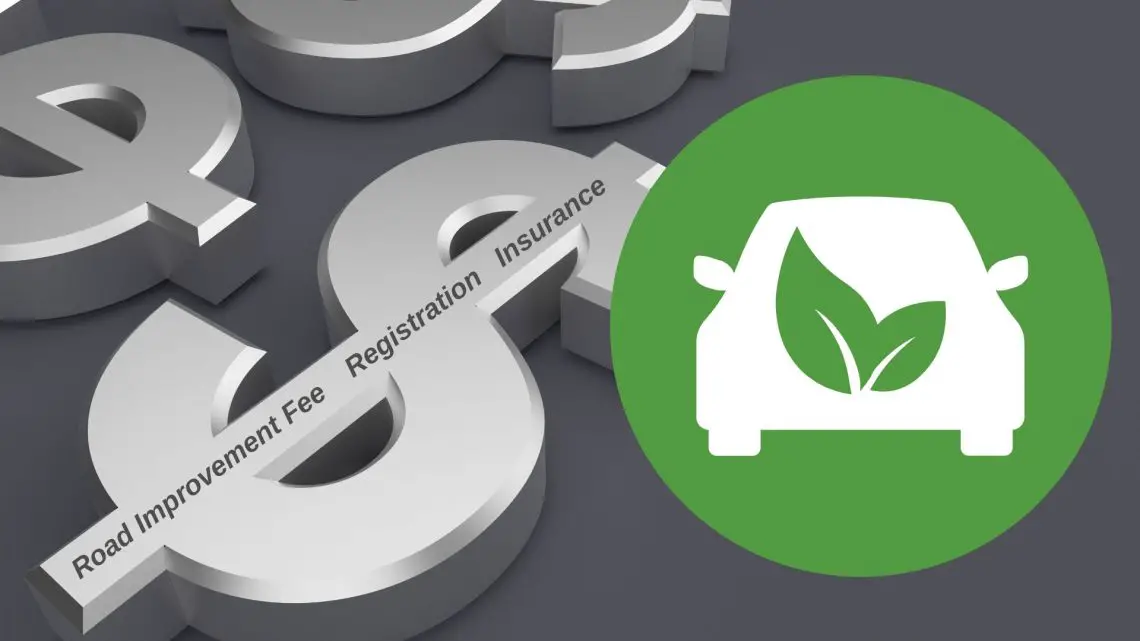
Why American Clean Car Owners Face Dirty Fees and Higher Costs
December 4, 2024Clean Car Controversy—How Fees and Anxiety Are Slowing EV and Hydrogen Adoption
Purchasing a hydrogen fuel cell vehicle or an electric car often feels like a step toward a cleaner, greener future. These vehicles are designed to reduce carbon emissions, improve air quality, and lessen dependence on fossil fuels. However, for many eco-friendly car owners, the reality of additional registration fees—on top of standard charges—paired with high insurance premiums and range anxiety is making these environmentally friendly options less appealing and financially burdensome.
Green Vehicles, Higher Costs
California is at the forefront of green energy and clean transportation initiatives, but owning a hydrogen fuel cell or electric vehicle (EV) comes with financial strains. Zero-emission vehicles are subject to an annual “road improvement fee” of up to $175 and set to increase every year. This fee, indexed to the California Consumer Price Index, is intended to make up for the dwindling revenue from gas taxes, which traditionally fund road and infrastructure projects.
Hydrogen car owners, like those who drive EVs, are subject to these increased fees despite the fact that their vehicles emit only water vapor. While the intent of these policies is to ensure everyone contributes to the upkeep of roads, many drivers feel penalized for choosing what are supposed to be eco-conscious options.
“It feels like a punishment for doing the right thing,” says Julian, a Sacramento-based hydrogen car owner. “I pay more for registration and insurance, and yet I barely use gas stations or do any harm to the environment. Shouldn’t there be some recognition of that?”
Sticker Shock Extends to Insurance
For hydrogen and electric vehicle owners, the financial pinch doesn’t stop at registration fees. Insurance rates for these vehicles are often higher than those for traditional gas-powered cars. Why? Insurers cite reasons such as the higher manufacturing cost of zero-emission vehicles, the expense of replacing EV batteries, and the specialized repairs needed for hydrogen fuel systems.
For example, a collision in a hydrogen fuel cell vehicle may require repairs not just to the body but also to its fuel storage system—an intricate and expensive component. EV repairs, meanwhile, might involve replacing costly electric drivetrain systems that are beyond the capacity of many standard repair shops.
“It’s frustrating,” says Mia, an EV owner from Los Angeles. “I feel like I’m being double-charged for driving a car that’s supposed to help the environment. Where’s the incentive in that?”
California drivers pay some of the highest insurance rates in the country, and owning a green vehicle often doesn’t come with discounts because the technology is still relatively new. For many, these added costs create a brand of “green guilt,” as consumers question whether their investment in the environment is worth the financial hit.
Why Aren’t Drivers Getting Discounts?
Given that both hydrogen cars and EVs help reduce greenhouse gases, many believe that drivers should receive discounts or benefits—not fees and surcharges. Advocates argue that clean vehicle owners should be rewarded for reducing their carbon footprints, which benefits society as a whole.
“One EV or hydrogen car on the road offsets dangerous emissions from traditional vehicles,” says Emily, an environmental policy researcher. “Yet the people driving them are being asked to pay more, from registration fees to insurance premiums. We need a system that supports—not penalizes—these choices.”
Some countries offer substantial benefits for drivers of hydrogen and electric vehicles, including free parking, toll exemptions, and insurance discounts. California, by comparison, lags behind in offering meaningful everyday incentives beyond limited tax credits for new vehicle purchases or charging station installations.
Unpacking Additional Fees for Green Cars
Many states, not just California, are implementing a rising scale for registration fees on zero-emission vehicles in order to make up for dwindling gas tax revenues. New Jersey, for example, will introduce the nation’s highest EV registration fee at $290 beginning in 2028. This reflects a growing trend across at least nine states—including California, Georgia, Indiana, Maryland, Michigan, Mississippi, North Carolina, Pennsylvania, and Utah—that adjust fees annually based on the consumer price index or similar inflation calculations. The goal of these policies is to prevent the eroding value of revenue from fixed-rate fees and ensure a steady stream of funding for transportation infrastructure.
As previously mentioned, California currently charges up to $175 annually for zero-emission vehicle registration fees. Hydrogen vehicle owners face similar costs. These fees far exceed those in states like Colorado, where EV drivers are asked to pay $50 annually, or in Idaho, where fees are capped at $140. Such disparities highlight how each state tackles the balance between encouraging zero-emission vehicle ownership and maintaining infrastructure funding.
While the collected fees are directed toward critical projects like road maintenance, bridge repairs, and public transit development, many drivers feel the cost distribution is unfair. Owners of EVs and hydrogen cars argue that they already contribute significantly to societal benefits, such as improved air quality and reduced healthcare costs associated with vehicle emissions.
Range Anxiety Compounds the Problem
One of the biggest barriers to EV adoption has always been range anxiety—the fear of running out of battery power far from a charging station. Hydrogen car owners face a parallel challenge, as the network of hydrogen refueling stations remains significantly limited. Both groups of drivers frequently report frustrations about planning trips around their vehicles’ limited range and the uncertainty of finding a nearby station or charging point.
While urban centers like Los Angeles have grown their EV charging networks, rural and suburban areas still suffer from a lack of infrastructure. For hydrogen vehicle owners, the situation is even worse. California, which accounts for 60% of U.S. hydrogen car registrations, has only about 60 operational refueling stations across the entire state.
For many potential buyers, these gaps in infrastructure are deal-breakers. A recent survey from the automotive website Edmunds found that nearly 60% of consumers hesitant to buy an EV cited range anxiety as one of their top concerns. This apprehension is reflected in recent industry data. According to the International Energy Agency (IEA), while EV sales in the U.S. rose significantly in 2022, the growth rate slowed to 40% in 2023, down from 55% the year prior. Analysts attribute part of this to persistent range anxiety, combined with rising costs of ownership.
Advocacy for Fairness
Hydrogen and electric car owners can take steps to advocate for fair treatment and smarter policies. Several automakers, consumer groups, and environmental organizations are already urging legislators to introduce equitable solutions. These could include offering lower registration fees, insurance discounts, and even free access to charging or refueling stations for drivers of zero-emission vehicles.
Individual drivers can also push for policies that allocate registration fees proactively. For example, ensuring these funds help expand hydrogen refueling stations or EV charging networks could create a more robust clean energy transition, benefiting both current and future drivers.
Another area of advocacy should focus on insurance reforms. Offering incentives, such as premium reductions for zero-emission vehicles or state-backed insurance subsidies, could ease the financial burden of owning these cars.



 With over 15 years of reporting hydrogen news, we are your premier source for the latest updates and insights in hydrogen and renewable energy.
With over 15 years of reporting hydrogen news, we are your premier source for the latest updates and insights in hydrogen and renewable energy.